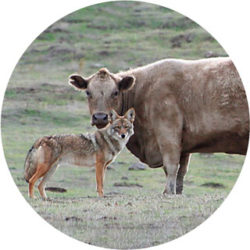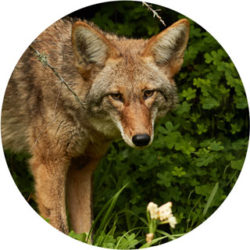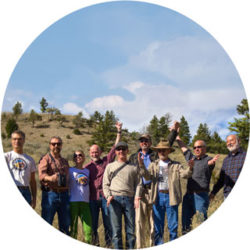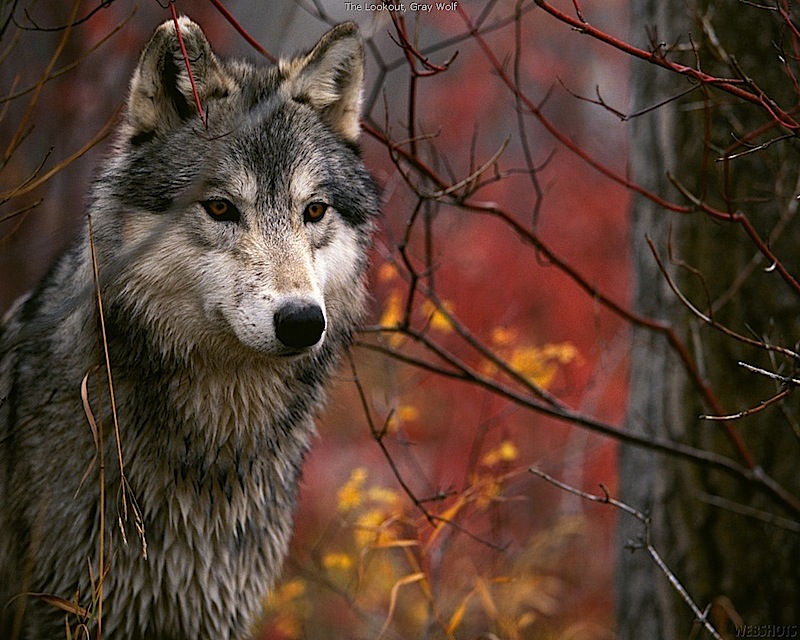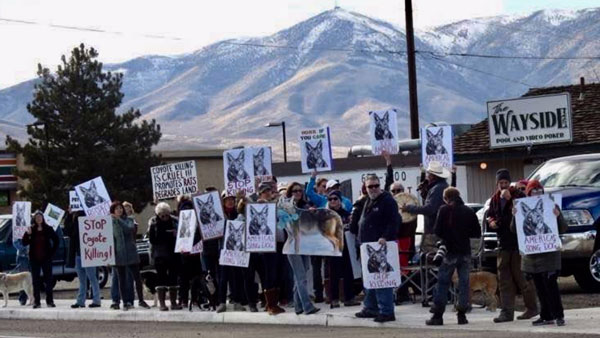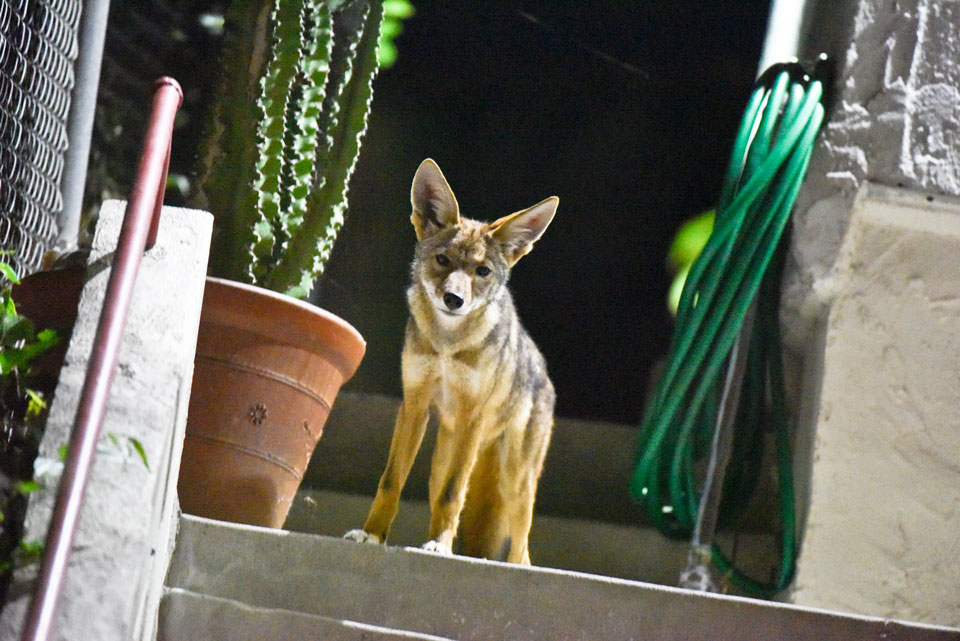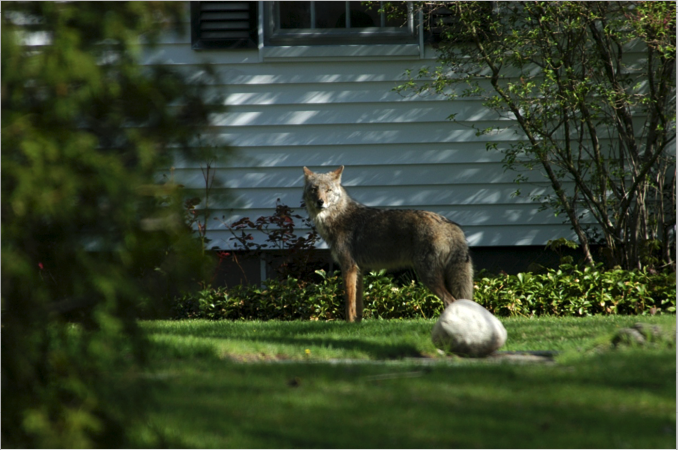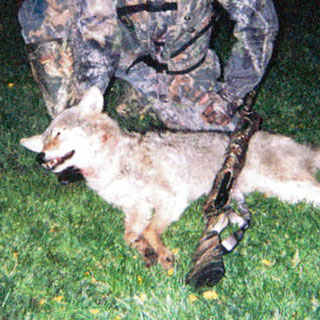APRIL 2018 IN THIS ISSUE:
Never doubt that a small group of thoughtful, committed citizens can change the world; indeed, it’s the only thing that ever has.
~Margaret Mead
As the current earth–hostile administration dismantles hard-fought federal laws and policies that protect wildlife and wildlands, I am reminded of the critical importance of grassroots and community-based action for change; and I’m happy to share some positive stories below.
On March 17th, Project Coyote Ranching with Wildlife Coordinator Keli Hendricks and I traveled to Corvallis, Oregon, to participate in the launch of a newly established Agriculture and Wildlife Protection Program.
Our presentations focused on the valuable role that native carnivores play in maintaining healthy ecosystems, and on the application of humane and nonlethal means for reducing conflicts with them. Following on the heels of the Marin County Livestock and Wildlife Protection Program and a central Texas county’s recent decision to end its contract with Wildlife Services, Benton County’s endorsement of a non-lethal pilot program for reducing human-wildlife conflicts is encouraging.
Fabulous news came early last month as the Albuquerque City Council voted unanimously in support of a resolution condemning coyote killing contests and calling upon the state legislature to introduce and pass legislation prohibiting the practice statewide. And the recent San Francisco City Council’s unanimous vote to ban the sale of fur gives us another reason to celebrate.
As we continue to work with communities to foster peaceful coexistence and support their decreasing dependence on indiscriminate lethal predator controls, we are also gaining momentum in our fight against wildlife killing contests, trapping and poisoning. This afternoon, our co-sponsored bill (AB 2422 – Assemblymember Richard Bloom) to ban dangerous rodenticides that pose a significant threat to non-target wildlife—including bobcats, mountain lions, coyotes, and the imperiled Pacific Fisher and San Joaquin Kit Fox—is being heard in the California Assembly Committee on Environmental Safety and Toxic Materials (read more below). I am pleased to share with you the following updates on some of our current campaigns and grassroots efforts to protect America’s ecologically vital predators.
For Wild Nature,
Camilla H. Fox
Founder & Executive Director
REFORMING PREDATOR MANAGEMENT
National: KILLING GAMES ~ Wildlife In The Crosshairs
Project Coyote’s film KILLING GAMES ~ Wildlife In The Crosshairs continues to reach audiences across the country as it tours with the Jackson Hole Film Festival’s WILD on Tour and Wild & Scenic Film Festival’s On Tour. More recently, KILLING GAMES was selected as Best Short 1st Place at the Animal Film Festival in Grass Valley, California (read more here), and screened at the Santa Barbara International Film Festival.
Track additional venues where KILLING GAMES will be shown across the country here, and listen to an interview with Director and Producer Camilla Fox at the Wild & Scenic Film Festival here.
National: Protecting Wolves
Thanks to public outcry and Congressional support, policy riders that would have eliminated Endangered Species Act protections for gray wolves in the Great Lakes states were dropped from the final version of the omnibus spending bill. Meanwhile, the National Park Service (NPS) tentatively decided to augment the Isle Royale, Michigan wolf population with 20 to 30 additional wolves over the next three years to replenish a population that has nearly died out because of inbreeding and disease. Currently, the Lake Superior island remains home to just two wolves.
Project Coyote Science Advisory Board member Dr. John Vucetich, who has studied the wolves of Isle Royale since the early 1990s, has been pressing the NPS to augment the population to restore ecological integrity to Isle Royale’s forest ecosystem by controlling the island’s swelling moose population, which is causing harm to its forests.
Vermont: House Votes to Ban Coyote-Killing Competitions & Proposed Crow Killing Contest Canceled!
On February 21, the Vermont House voted 79-45 to ban coyote-killing contests (after amending the bill to remove potential prison time). The bill now moves to the senate. If the bill passes in the senate, Vermont would become the second state—after California—to ban the awarding of prizes for killing coyotes as part of a contest, tournament or derby. Read more here and here. And momentum builds to end all wildlife killing contests in the state, as evidenced by mass protests against a proposed killing contest targeting crows that led to the sponsor canceling the event. Read more here.
National: Protesting Wildlife Killing Contests
Concerned citizens across the country are calling for an end to wildlife killing contests. Some of this outcry comes in the form of letters to the editor (see here and here), op-eds and municipal resolutions condemning the practice. Community members are also taking to the streets to protest these barbaric events.
For example, in Cape Cod, Massachusetts, more than 70 people showed up to protest the first-ever killing contest in that community. On January 6, Project Coyote volunteers and community residents protested the Lemmon Valley, Nevada coyote killing contest, garnering coverage by local television stations and newspapers. And in Georgia, opposition to the Georgia Coyote Challenge is growing louder, as evidenced here and here. Project Coyote’s Science Advisory Board Members garnered support from more than 50 scientists condemning the killing contest, including Dr. Chris Mowry and the Atlanta Coyote Project—which has taken a highly visible stand against this senseless and scientifically unsupportable event.
California: Update on Trapping Fees Lawsuit
In September 2017, the Center for Biological Diversity (CBD) and Project Coyote sued the California Fish and Game Commission and Department of Fish and Wildlife for improperly managing and subsidizing the State’s trapping program. According to a new review of the department’s economic analysis by CBD and Project Coyote, hundreds of thousands of dollars a year in expenses were omitted from DFW’s recent estimate of the cost of running the state’s commercial animal-trapping program. Project Coyote and CBD’s comment letter denounces the analysis’ complete omission of a list of annual enforcement costs, including game warden salaries. Previous analyses have included such annual enforcement costs, which in 2013 alone totaled $161,000 for the trapping of just one species—the bobcat. Since 2013, because income from trapping fees has been so low, as much as a half-million dollars of taxpayer money has been diverted to subsidize commercial fur trapping in the state. The new study contradicts the Department’s own prior analysis of trapping program costs, with current estimates slashed to at least one-third of previous cost estimates. If the illegal subsidy of trapping licenses were eliminated, trapping license fees would be set at a level that few, if any, trappers would willingly pay, which would result in a de facto end to commercial fur trapping in California. Read more here.
National: More Communities Reconsidering Approach to Predator Management
As lethal predator control comes under increasing public and scientific scrutiny, more communities are reevaluating their methods for solving human-wildlife conflicts. We are particularly encouraged by Travis County, Texas’ recent vote to cancel its contract with Texas Wildlife Services (which is associated with USDA’s Wildlife Services), and instead focus on nonlethal conflict management of coyotes. Read more here.
California: Fish & Came Commission to Vote on State’s Predator Policy
On April 19, the California Fish and Game Commission (“Commission”) will vote on the adoption of a predator policy that will provide the framework for how the state approaches predator conservation, stewardship, and management. Learn more and please sign our petition here; if you live in California, please join us by attending and testifying at the Commission meeting in Ventura, CA (for more information, see our Action Alert here). Your presence can make all the difference!
New Mexico: Albuquerque Mayor Signs Resolution Condemning Coyote-Killing Contests
Albuquerque City Council Resolution R-18-5, which condemns coyote killing contests, passed the City Council unanimously, and has been signed by Mayor Tim Keller. The measure calls on the State Legislature to introduce and pass legislation banning coyote killing contests statewide. Read more here.
RANCHING WITH WILDLIFE
Project Coyote’s Camilla Fox and Keli Hendricks presented at the Farming with Wildlife Workshop in Corvallis (Benton County), Oregon on March 17. The workshop is part of Benton County’s Agriculture & Wildlife Protection Program, a two-year pilot program initiated in June of 2017 “to encourage the proactive use of non-lethal animal damage deterrents in an effort to foster the coexistence of agriculture and wildlife in Benton County.” The program serves as a model of non-lethal coexistence in ranching and farming communities across the country. More information to come!
COYOTE FRIENDLY COMMUNITIES
California: Bay Area and Beyond
In March, the southern California city of Whittier adopted a proactive Coyote Management Plan that emphasizes public education and the hazing of habituated coyotes and emulates models that Project Coyote has created for various western cities, agencies, and communities through our Coyote Friendly Communities Program.
Project Coyote team members have been making the rounds in the California Bay Area, spreading the word about compassionate coexistence. Communications Advisor Gina Farr gave a presentation in Fairfax; Marin County Parks Chief Ranger and Project Coyote Volunteer Educator Rob Ruiz spoke on living safely and peacefully with coyotes; Rob will be speaking again in Novato on April 12; Ranching with Wildlife Coordinator Keli Hendricks gave well-received presentations in Mill Valley, CA; Berkeley, CA; and the Carolyn Parr Nature Center in Napa, CA (with details on other talks and venues coming soon!).
Northeast United States
Project Coyote New Hampshire and Vermont Representative and Wild Canid Ecologist Chris Schadler has maintained her nonstop agenda of presentations in the Northeast. Most recently, Chris has given talks at the Meredith Bay Colony Club in Meredith, NH; the Rye Public Library in Rye, NH; Birch Hill Terrace in Manchester, NH; Lincoln Hall in Boxford, MA; and the Fox Research and Demonstration Forest in Hillsboro, NH.
New Mexico:
Project Coyote Representatives Judy Paulsen, Joe Newman, Vicki Markus, Kézha Hatier-Riess and Dave Parsons have all participated in public outreach efforts and presentations throughout New Mexico, bringing our message of coexistence and compassionate conservation to policy makers and to the general public. In addition, Joe, Judy and Dave have been involved with the New Mexico Trap Free Coalition aimed at banning the use of dangerous body-gripping traps on public lands.
SCIENCE, CONSERVATION, & STEWARDSHIP
California: Reevaluating the Use of Anticoagulant Rodenticides
The California State Assembly Committee on Environmental Safety and Toxic Materials considers adoption of AB 2422 on April 10. The bill would expand the current prohibition of pesticides in the state to include “a pesticide containing any anticoagulant” and “would also prohibit the use of a pesticide containing an anticoagulant in the entire state.” You’ll recall that Raptors Are The Solution (“RATS”) and Project Coyote filed an administrative challenge to the Department of Pesticide Regulation on December 22, 2017, requesting re-evaluation under CEQA of the use of certain anticoagulant rodenticides because of their “significant adverse impacts [on] a wide range of wildlife species.” Read the comment letter and exhibits here, and please see here for ways to make your voice heard to ensure adoption of AB 2422!
RECENT NEWS
Coyote howls have you cowering? Don’t fear, says this Atlanta advocacy group
The Department of Natural Resources wants hunters to lower the coyote population. But the Atlanta Coyote Project wants to change the narrative. Read More
Lobos lose again as the state Game Commission OKs plan it dictated
Contrary to the Journal editors’ claim that the revised Mexican wolf recovery plan reflects compromise and science, it reflects special interest politics and flawed science. Read More
Experts howl at ‘coywolf’ headlines; limited NH hunting season called for
A wildlife advocacy group is asking the state Fish and Game Department to shorten the season on coyote hunting, currently allowed year-round. The petition by Voices of Wildlife in New Hampshire, which calls for a hunting season from Oct. 15 through March 31, will come before the Fish and Game Commission in Concord on Wednesday at 1 p.m. Read More
Does hunting reduce coyote populations?
Differences of opinion exist as to the overall effect of hunting efforts, especially big, organized hunts, on coyote populations. Many hunters believe taking out coyotes helps wild-game populations by removing a top-end predator from the landscape, although no eradication attempt has been 100-percent effective. Read More
IN CLOSING…
A gentle reminder to all: pupping season is beginning—coyote families will be raising their young. Please live safely and peacefully with our native Song Dogs; find more information on coexistence here. Download our brochures and signage, share with your neighbors, post signs on trailheads and in your community! Learn more about what you can do here.
Join our E-TEAM
Get periodic e-news, action alerts, and join our growing network of educators, scientists, predator friendly ranchers and citizen leaders who are helping people and wildlife coexist in our communities.
Join a growing community of educated and empowered citizens by expressing your commitment to compassionate conservation with a financial investment.
You can DONATE, become a SPONSOR or leave a LEGACY GIFT.


